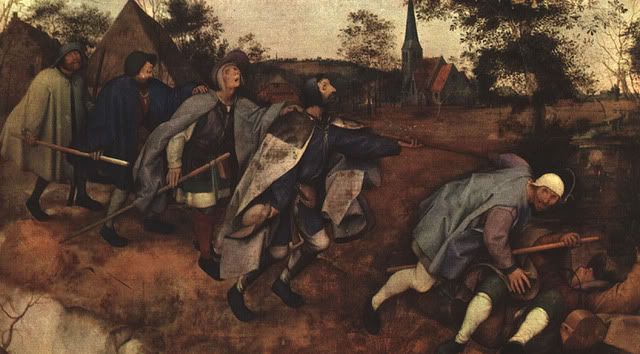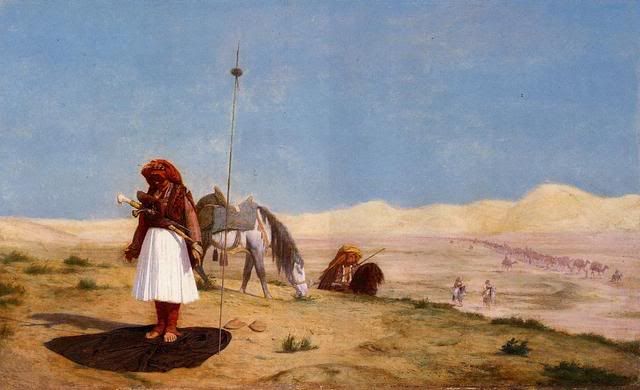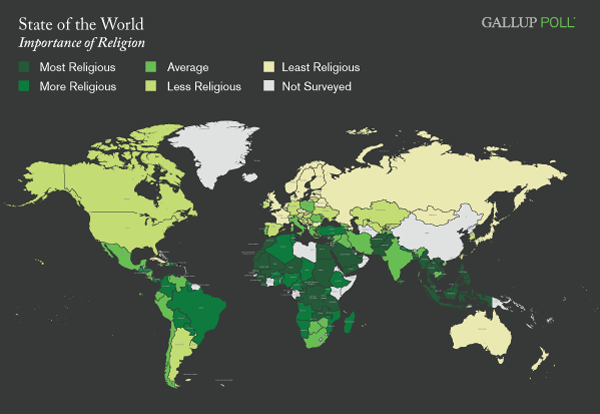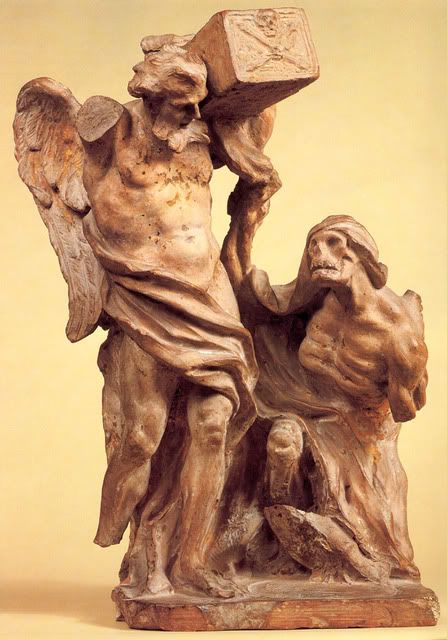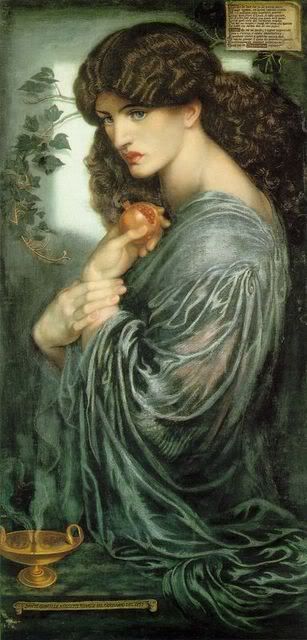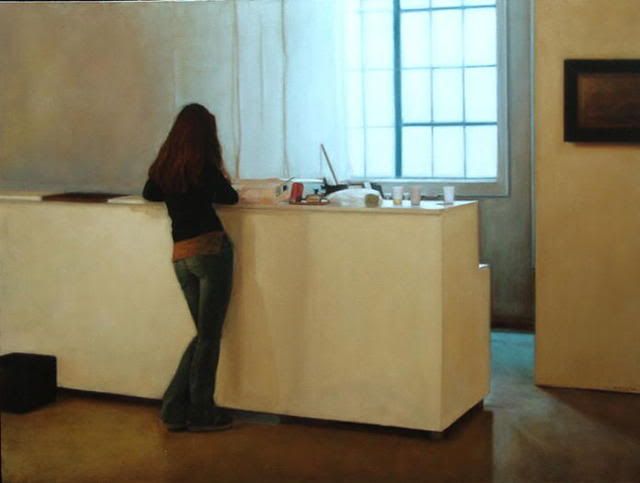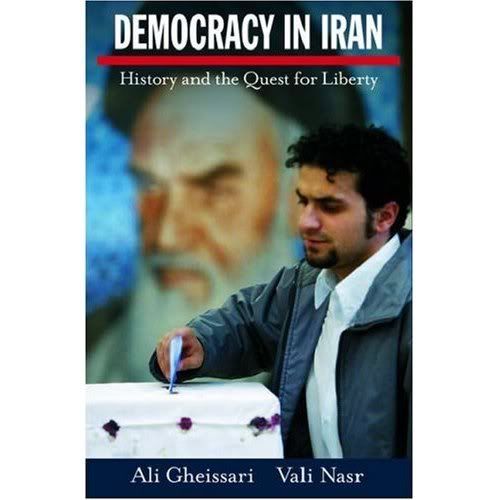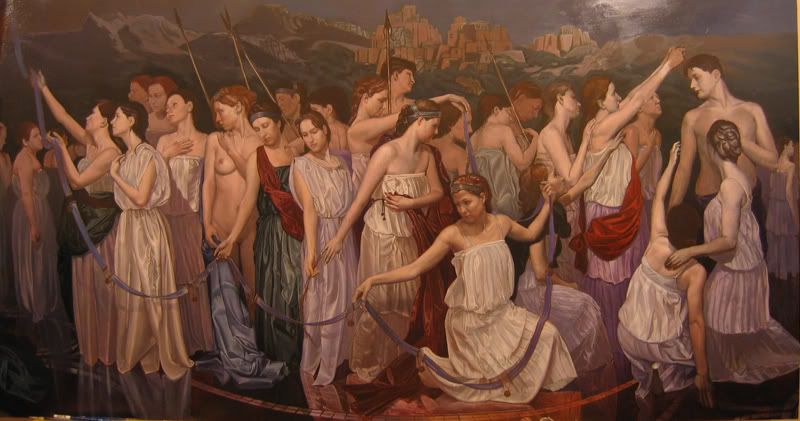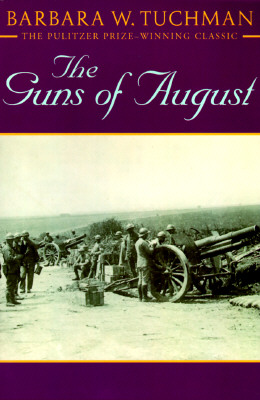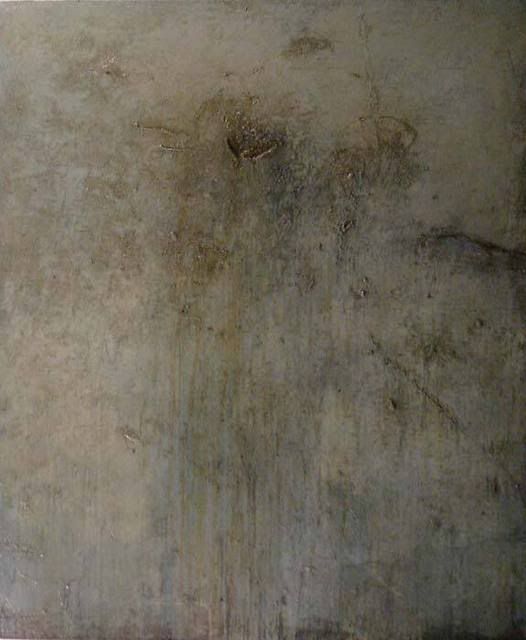The discussion ... goes to the source of the dispute between Western and Islamic legal systems: the distinction between reason-based ethics and revelation-based ethics.
-jinnzaman, in comments made at eteraz.org[This was originally posted on 19 March 2007. A pair of conversations over at
Talk Islam (see
here and
here) have inspired me to repost this, and to link to it from the Talk Islam site. Please note that all links to the original conversation at eteraz.org are now broken, and as such have been removed. -LoA]
In the midst of a very heated discussion last week at eteraz.org concerning the nature of the government one ought to desire, there was another set threads that took up a distinct, but not unrelated discussion concerning the role of reason within theology. Especially since JM made several substantive references to Al-Ghazali, and I made occasional and not-so-substantive references to Al-Farabi, Ibn'Arabi and Ibn'Rushd, the discussion harkened back to a debate that took place during the classical age of Islamic philosophy and the tensions that emerged within Islamic thought after the discovery of Greek philosophy. Falsafa is itself, obviously, a loan word from the Greek and so philosophy was constantly vulnerable to charges of 'innovation' in the Arabic speaking world.
I repost the conversation, as it occurred across several articles, for a pair of reasons. First, it touches upon issues that are dear to me. The call of God, under which we all stand, places us in a position such that we are, unavoidably, often against our own will, pilgrims towards a Truth which exceeds our present moment. Second, I think it is important that the discussion between Philosophy and Theology not be forgotten, because while we certainly do not comprehend God, reason will always reach out to transcend itself toward that which it does not yet know. Moreover how we understand our relationship to the God that becomes manifest in revelation will, unavoidably, shape our understanding of the political realm.
Finally, the term "positive", as it is used here by both JM and myself means "something one experiences as simply a given; having and needing no other justification than its sheer givenness". It is a datum or positum (in the sense that you might posit something, or de-posit money into the bank).
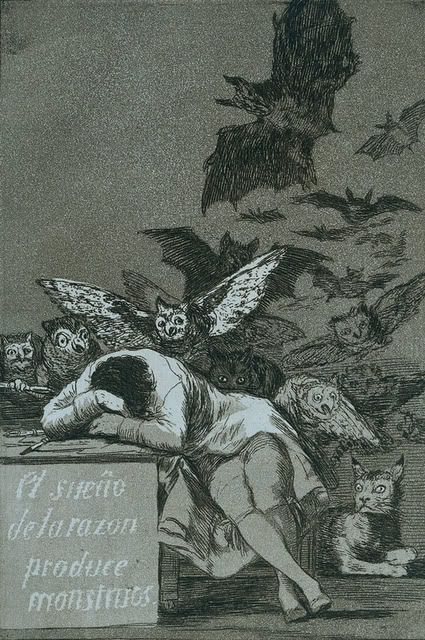 Francisco de Goya, "El Sueño dela Razon Produce Monstruos" (1799) [Etching with Aquatint]In an ongoing discussion at eteraz.org, Irshad Manji had suggested that the following would need to be inserted into the St. Petersburg declaration in order for it to be signable:
Francisco de Goya, "El Sueño dela Razon Produce Monstruos" (1799) [Etching with Aquatint]In an ongoing discussion at eteraz.org, Irshad Manji had suggested that the following would need to be inserted into the St. Petersburg declaration in order for it to be signable:“Practicing Muslims are an integral and valuable part of the global community, as well as essential to any movement for secular, faith-respecting states that work toward universal human rights. We acknowledge the peaceful observance of Islam to be a legitimate choice for many. We stand by those who embrace an Islam that defends critical thinking, empathy, justice, and non-violence. They are our allies, and we are theirs.”
To this jinnzaman (JM) responded with the following brief comment:I have two questions: (1) Why do you think human rights are universal? (2) What is your definition of justice? Is it one that is based on Islamic sources of legislation such as the Qur'an, Sunnah, etc or do you subject the Islamic source to contemporary Eurocentric ethical systems?
JM followed up this comment shortly thereafter with:The dis[tinction] is not a false dichotomy, but goes to the source of the dispute between Western and Islamic legal systems: the distinction between reason-based ethics and revelation-based ethics. By contemporary European ethical systems I'm referring to Kantian, Utilitarian, and social contract theories of ethics. By Islamic ethical systems, I'm referring to the theological framework established by the various Kalam schools, the Asharis and Maturidis. The aqeedah of Ahl us Sunnah is that their is nothing that has innate goodness/badness within it; these terms are defined by Allah (subhana wa ta'ala). As such, what is termed as "justice" is not what human beings define as "justice", but rather, what the Creator deems to be "just" since He possesses the attributes of infinite knowledge, foresight, and justice. Thus, when people talk about "reforming" Islam, they usually either inadvertently or intentionally interpolate contemporary Euro-centric ethical views into the classical Islamic traditions. One area of conflict is over this definition of "justice". For Muslims, the central concept of human relationships with one another as well as their Creator is the concept of submission to the Creator, not liberty. In other words, all ethical obligations and rights are granted or taken from the Creator. Thus, asking questions such as: what is the definition of justice, and whether human rights are truly "universal" and on what grounds other than tautology, syllogism, or social contract theory, are entirely pertinent questions.
This pair of comments, combined with JM's post entitled "Firestorm" which outlined a political vision of the Islamic world that was (for me at least) disturbingly close to the failed and destructive policies of the '79-Revolution led me to respond and defend the rights of falsafa. I, of necessity, speak as a non-Muslim; I am Christian. But the issues raised here have such bearing on how one understands the relation between revelation and reason, how one must do theology, and the relationship between God and the world, that they cross the divide between all of us who believe in the God of Abraham and unite us in a common conversation. This is not, then, a conversation about whether or not God has revealed Godself, but a matter of humanity’s disposition in the face of the God who reveals.Reason itself must be a divine creation and therefore oriented toward God and so there can be no strong divide between philosophy and theology. Second, even if we were to accept some sort of rigorous distinction between reason and revelation, one can only know revelation by way of reason. One needs reason to understand what it says. this would mean at the very least that even if reason could not by its own power provide any knowledge of what was good it would at least have to provide a formal structure by which something could be known: reason would be the power to know and if something was to be known it would have to conform to the human capacity for knowledge. this raises two points: 1. this actually brings you very close to Kant; 2. even an analysis of the conditions of knowledge can actually tell you quite a bit about what revelation must be, what God must be and who humanity must be in order to conform to the formal structures of reason. Third, a position which strongly separates revelation from reason actually contributes to and helps maintain a strong understanding of the secular and thus the types of "justice" and "liberty" which are meant to be denied by a pure theology are going to be reinforced by theology's insistence that it remain pure. The other side of that is this: to separate knowledge of God from human knowledge really leaves God an unknowable and arbitrary power undermining any hope of union or reconciliation with God. There is nothing but submission to a tyrant for no other reason than fear of its power.
This prompted JM's reply:Firstly, where did you get the impression that Muslims treat reason itself with disdain? What we're discussi[ng] are rational systems, not reason itself. Criticizing deontology or utilitarianism doesn't make one irrational, especially when a person is doing so on purely rational grounds. My point is that before applying these ethical systems to Islam, they need to be substantiated on independent grounds. This request isn't a denial of reason, but an assertion of rational justification.
Secondly, reason is a divine creation, but so are base desires, which are nonetheless prohibited in Islamic jurisrpudence as a source of morality. The question needs to be asked: why should reason be used as a source for ethics in the first place? What type of reasoning are you referring to: rationalism, empiricism, pragmatism, dialectical materialism, science, etc. Islamic theology incorporates rationalism, empiricism, and possibly pragmaticism, as well as mystical tendencies. It is as equally valid a tradition as Western reasoning is, although it is definitely distinct. Just because Muslim theologians came to different conclusions from Western philosophers does not make them irrational. The dispute itself is over how we reason and which type of rational conclusions are utilized in moral judgments. Second, with regards to the argument that reasoning must be used for relevation, again, I would ask you what you mean by "reasoning" and why do you think its a basis for understanding revelation. The Qur'an is a self-extrapolating document. One doesn't need to be a philosopher to engage in basic statutory interpretation. The issue is whether the direct positive commands of an infinitely knowledgeable being can be properly comprehended by beings that are finite in their existence in knowledge. Muslims believe that God is suprrational, not irrational. In other words, they believe God is beyond reasoning and we might not always understand His reasoning. This is why His explicit and unambiguous statements are taken as positive commands. So while reason is utilized to understand the texts themselves, they cannot possibly understand the legislator's intent aside from a basic hermeneutical analysis.
I'm not sure about your third position and whether you've substantiated it so I'm going to ask you lay more foundation. Terms like "good", "evil", "justice" and "injustice" are defined by the Creator. Things are not good/evil in and of themsleves. Justice is not a quantifiable property; it is not a physical characteristic of a material object, it defines human behavior. If the moon crashes into the sun and gets obliterated, this might be a catastrophic event, but it is not 'evil' or 'unjust'. These terms are moral judgments and again, this goes to the question of how moral judgments are made. For Muslims, the source of our ethics is from Allah (subhana wa ta'ala) and revealed texts. Western ethics are based on certain pressupositions that ultimately get reduced to metphaysical assumptions that are ultimately tautological. If they are tautological, then an opposite statement is equally valid. There are no ethical or philosophical grounds by which Westerners can criticize Islamic ethics, otherwise an equally valid right exists for Muslims to criticize Western ethics.
The Islamic conception of God is one of infinite knowledge, power, justice, but also of infinite concern with humanity. his legislation is there for the ultimate benefit of humanity in this life and the next, even if we don't comprehend it. The goal of paradise is not merely physical pleasure, but being in the company of the creator. So, I don't really buy this whole idea of God being tyrannical. It simply is not possible for a human being with finite knowledge and limited sensory perception to comprehend a being with infinite knowledge. separation is a necessity, not an option.
Lastly, the ultimate purpose of rights and liberty from either a deontological or utilitarian perspective is to promote autonomy. Autonomy is defined as the promotion of volition and the negation of forces of coercion. Western political philosophy focuses on developing measures to prevent external measures but fails to take into account that human beings have innate trends that infringe upon their own autonomy. For Muslims, coercion is external but also internal as well. Islamic law rejects the base self (nafs) as a source of legislation and ethics. Personally speaking, irrespective of my religious views, I agree with this conclusion.
Before getting to the larger response, I think it is important to note that one has to accept this criticism of "foundationalism" if, by that term, JM means that humanity possesses some sort of sure and secure standpoint, of itself, by which it is capable of judging the truth of things, the truth of revelation even, for itself. I have no desire to deny this criticism of foundationalism. Our whole being is experienced in its gratuity and the Truth itself comes in freedom (which should not be confused with choice between two options). But this is merely to say that our being is directed beyond itself, towards God, who is All-in-All.I want very much to be clear: I did not say that Muslims treated Reason with disdain. I was specifically being critical of the position you articulated. The position you are espousing is not specifically Muslim, nor is it by any means the position of Islam as a whole. You certainly find versions of it among Christians and others. The real dilemma is that the contrast between a "reason-based ethic" and a "revelation-based ethic" is problematic from the start because the so-called revelation-based ethic is always going to be dependent on reason, for, at the very least, both its acceptance and its interpretation: which is precisely what the contrast is meant to disallow. Nor do i have any desire to deny the appeal and rationality of the various traditions within Islam. No tradition can have the broad appeal and the ability to organize cultures, nations, peoples, the ability to generate amazing works of mathematics, philosophy, architecture, the arts etc, and not provide a compellingly rational account of the world. Though my knowledge of Islam is quite limited, i have nothing but respect for al-Farabi and al-Arabi, with whom i am somewhat familiar and for that matter do not understand them to be so far removed from many of their non-Muslim counterparts. But i don't think either you or I believe they are all "equally valid …tradition[s]", otherwise it would be a matter of indifference how we aligned ourselves with respect to the various traditions. The fact that i cannot help but orient myself toward God in one away, rather than another, means that for all my respect for (and in some cases lack of respect for) other traditions, i find them less adequate, compelling, promising, etc. They lack rationality for me, somehow, to an extent that i cannot embrace them as my own. There are reasons, for instance, why you are not Presbyterian!
The crux of the matter here is that Reason is always in play, always at work. to make an appeal to that which is beyond Reason as providing an unassailable truth is to leave the bounds of meaningful conversation. I can only understand the claims of texts like the Qur'an or the Bible insofar as they make an appeal to me. This is not to say that the texts ought to be philosophical, but the claims that those texts make on us in the end demand a judgment: will we embrace them as our own, or no? The fact that we are finite beings points to reality that the discussion over the Truth is not yet closed, has not yet reached its completion and is not yet fully known. Once again, if it were, there would be no need for this discussion. also once again, this is not to deny that one always finds one tradition more adequate in pursuing the Truth, but the Truth has not yet been fully realized. One is still in the troublesome position of having to make judgments.
The appeal to the infinity of the divine is the way in which many of us, including myself, talk about the brokenness of our own self-understandings, the incompleteness of any account that one might try to give of the human person in the present moment. It is essential to the way in which we talk about the fact that we desire to be more and other than we are, that we desire to transcend ourselves; we desire ecstasy; we desire to be Whole.
On the other hand the appeal to the infinity of God cannot be a way of short-circuiting Reason and the way in which it guides us in all that we do. Reason always extends itself to that which it encounters as merely positive, in order to incorporate, understand and judge it. You attempt to reduce Reason to a purely hermeneutic faculty with respect to revelation. But Reason will not allow itself to be so limited. Already, under such conditions, Reason will run ahead of the experience of revelation and set the conditions by which any such thing can be given. Revelation will have to present itself in the same way as any other object; any positive revelation, 'revealed religion' as the nineteenth century thinkers were fond of calling it, will have to enter into and become a part of the world of objects. At the moment it does this it becomes part of Reason's drive to grasp the world in its completeness. Likewise Reason will run ahead of any discourse and set the conditions. Experience, even the experience of revelation, must manifest itself to us, to specific kinds of knowers at a specific time and place.
Moreover, by even granting that there is such as space that belongs to revelation alone, over against Reason, which would apparently be left to go off and construct regions of human inquiry like mathematics and biology, one creates the very divide by which the secular arises. The secular becomes the space of merely human endeavor. In allowing the secular to arise in such a way, one actually reinforces the social and political conditions that allow liberalism and capitalism. Instead we must insist that it is precisely through the cultural discussions we have, which include arguments over the meaning of terms like "justice", "good", "liberty", "freedom" that we are entering into a discussion over the nature of humanity and its life toward God. We are concerned with human wholeness. This allows no space for the secular - a position with which i suspect you are sympathetic. It is precisely by denying the split between reason and revelation, by tying the two inextricably together, by insisting that the human person cannot be so schizophrenically divided, that one is in a position to criticize the dehumanizing effects of liberal life.
And this has bearing on the point concerning the arbitrariness of God. If God is conceived as that which is so other that Reason cannot go there, that the commands of God must be accepted merely as something positive, then humanity finds itself in the grip of a tyrant. We obey, not because we experience the commands as the truth of who we are, or even as Truth, but because we are at the mercy of that which threatens to overwhelm us. You push the understanding of God in this direction when you insist that "good", "justice", "evil", "injustice" etc. are entirely dependent on the meaning which they are given by the creator: that they do not have inherent meaning: that, somehow, to say Good and Justice is not also to say God and the Infinite, with all the problems involved therein.
If, when you said that these terms of no meaning in themselves you simply meant that of ourselves we are nothing, I certainly would not argue. But this still does not break the connection between Reason and the divine since insofar as we are we are from God. And, moreover, insofar as we are, our rationality drives us back towards that which is beyond all existence: the All in All.
Given some understanding of creation, I am not sure that Islam, any more than Christianity, can allow that any of our desires are truly base. Certainly we often direct our desires towards inadequate ends, but we are, as whole persons, desirous of the Good which is God. I am not sure what exactly one means when one says that these desires are not a source of ethics. As I understand it (and, i stress that my understanding of Islam is quite limited) the 'nafs' indicate precisely the lack of light, the misdirection and deformation of the will and thus that desire is not correctly ordered and illuminated. In this case it is not that one rejects an analysis of human desire in ethics or politics, but that one criticizes the inadequacy of certain desires. Surely the satisfaction of basic material and physical necessities is fundamental to any account of a just society as well as individual concern for other persons. And one moves on from there to try to satisfy higher order desires.
The very limitations to being human, to which you are sensitive in stressing the need for revelation, are the very reason it is important to remain with Reason. It is there that the Truth is manifest. It is the reason we struggle. It is why there is theology and philosophy. Human beings desire the Whole.
At this point the conversation came full circle and we turned to a discussion of how one might go about understanding what it is we mean when we say "Justice". Another defender of Kalam, Saif, stepped in at this point. His contribution is important in that it shows there is more at stake here that has been shown so far. The attempts of falsafa to defend itself against the critiques of Kalam, do not only bear of the status of Reason, but also address the question of whether or not time and History must be treated as real aspects of humanity and thus of God's manifestation to humanity.I think that there needs to be a separation of God's law and the application of God's law to a particular case. Shariah is man's best attempt at application of Allah's law in my opinion.
Whatever you may say, shariah does not only apply to the individual. History and the Quran testify to this. I don't advocate allowing adultery at the state level. I don't advocate allowing homosexuality at the state level. I don't advocate allowing anti-Islamic things. Now it is time to use a cliche statement: "No person is an island." Every human being has an effect on other human beings. Granted, these days with no Islamic leader there is no one to apply the Shariah, so we are left with applying it to ourselves. I don't think that this means classifying the Shariah as only applying to the individual.
I'm just wondering...since when are the literal interpretations of Quran and Sunnah unjust? I am completely against calling them unjust. The prophet used these punishments, but in a different context, and he was definitely not unjust. How does justice change over time? Are we some new human race 1400 years later? No. If you want to base leniency on the mercy that the Prophet practiced and encouraged, then I'm ok with that.
….
Innovation is external. The essence of the human being, his soul, is the same. If I was transplanted to 1400 years in the past as a baby and was raised 1400 years in the past as a baby, I'd fit in 1400 years in the past with no problem. I think the same is true if someone from the past was transplanted to today.
The human being did not change at all. All that changed were the external conditions in which the human was raised. Does that mean that our external conditions define who we are, and we should do nothing except adapt to them? I don't think so...we should play an active role in shaping the external contidions to what we see as fit, what we as human beings define as right, which for Muslims are Allah's commands. We have a will...we can do it.
I don't think that chaos and needless suffering is the goal. What is unislamic about technology, about science, etc.? What is unislamic about certain types of clothes, aside from a lack of modesty? Nothing. There is no purpose in wearing 7th century Arab clothing today. There are many things in this world that are not right though, and Islam, the essence of Islam, should not take a backseat role only if everyone else does it. We have a responsibility to right.
Yes, warfare has changed. Powerful countries drop nuclear bombs and develop them while advocating nucear nonproliferation. Rich countries declare war, drop bombs, cause chaos, and then decide to leave. Thousands if not millions of soldiers and civilians die needlessly, for nothing more than powerhungry rulers who they foolishly swear allegience; soldiers do not fight in the name of their ideals. Wars are not fought in the name of justice, but greed. Even worse, a war in the name of greed of money or power is hypocritically fought in the name of justice. All is not well with the world today. I think that the world is getting worse day by day, not better.
In defense of falsafa I replied:saif said: "If I was transplanted to 1400 years in the past as a baby and was raised 1400 years in the past as a baby, I'd fit in 1400 years in the past with no problem. I think the same is true if someone from the past was transplanted to today. The human being did not change at all. All that changed were the external conditions in which the human was raised."
This is pretty much to say that human beings have changed. Culture is not an external. There is no rigorous divide between the individual and its community. 'Human being' is not some timeless reality independent of its historical location as your own statement itself acknowledges. One acts in the time and place in which one is, out of the possibilities given in that situation. This is not the same thing as quiet conformity, it is simply a recognition that the questions and problems facing us today are not the same as those that faced humanity, e.g., 1400 years ago.
Saif responded briefly with:No, what I said is the essence of a human being is the same, that a "human being" is a timeless reality. The only differences come from the conditions in which we are raised. I didn't state what I meant clearly when I said that culture was an external... I forgot to mention that culture is internalized...that is why I said to transplant a baby to the past. If people 1400 years ago are so different from us today, then what about a man born in a village vs. a man born in the city. What about a man born in the US vs. a man born in a very poor country? Are they completely different people? Is there a different definition of justice for both of them, or is there one definition of justice? I'm not advocating going back to 7th century arabia and using all of the laws from there. I'm saying that justice does not change between times. There is an eternal definition of justice. There is a such thing as right and wrong...they are not relative. All that can be done today is try to apply the ideal of justice to whatever situation we find ourselves in today.
Insisting upon the real historical nature of human being and rationality, I replied:Obviously, justice then and justice now are two different things. Just look at the way visual representations of justice have transformed if nothing else. While courthouses regularly have statuary of blind-justice (justice with her eyes covered by a blindfold), such a representation would have been non-sensical or representative of a failure of justice in the middle ages.
Ideals are hardly eternal; they are instead deeply connected with the practices of the communities of which they are a part. one can think of the way in which ideals of marriage or love have changed over...the last century...not to mention 1400 years. And I suspect, even as it is within Christianity, that it is very difficult to talk about the human essence or human nature within Islam, because of the doctrine of creation. Essence or nature usually refers some quality of a thing taken on its own. The essence is what divides it from everything else. But in and of ourselves human beings are nothing, we only are insofar as we are from God...and even in that [our] being does not find its end in itself, but must exceed itself, back towards God who is beyond all being.
And what else, but that can you possibly mean when you say that we try to apply the ideal of justice to this or that situation than that we try to live our lives towards the divine? To desire Justice is to desire God. Our traditions are the continued attempts to overcome our brokenness and find Justice, the Good, etc.
All of this is not to say there is no continuity between us and our past. We can only have gotten here from there. But history happens as humanity struggles for wholeness.
This brought JM back into the conversation on behalf of Kalam with a very thoughtful and articulate statement of what was at stake in his understanding of justice:
Let's start defining terms like "justice", "autonomy", "good", "evil".
As I stated before, the interpretation of the term "justice" from a Western perspective and an Islamic perspective is different. Both Sunnis and Shias believe that the Shari'ah is inherently just because they emanate from Allah (subhana wa ta'ala) who is all-knowing and infinitely just.
The benefits/burdens of ahkam are not limited to the material world, but include the benefits/burdens accrued in the hereafter, which are greater than this world. Unlike previous Prophets, Rasulullah (sallahu alayhi wa sallam) was a universal prophet who was to deliver the message of Allah to all of mankind until the day of judgment. Thus, his commands and those contained in the Qur'an are presumed to be binding unless shown otherwise.
When I say "Islamic" conception of justice, as opposed to Western, I'm referring to the formalized opinions of experts in Islamic theology. For Ahl us Sunnah waal Jam'ah, this would refer to the Atharis, as well as the two schools of Kalam compromised of the Asharis and the Maturidis. For Shiat ul-Ali, this would refer to the aqeedah developed by their scholars that is similar to the Mu'tazila. Clearly, the claim that 'there's no distinction between Western and Islamic conceptions of justice' is merely a claim that requires substantion. Although their may be some overlap in these terms, they have different roots. The underlying roots, by which rational and moral judgments are made, in Islam is revelation. Rational arguments may be persuasive, but not mandatory. Conversely, Western philosophers don't take revealed texts as the exclusive source of rational and judgments. Revealed texts is persuasive, not mandatory proof. Claiming that there's no difference between Western philosophers and Islamic theologians is a tautological statement in the absence of proof.
According to Ahl us Sunnah waal Jam'ah, the definition of justice can be divided between substantive and procedural justice. Substantively speaking, the ultimate source of our understanding of justice comes from Allah (subhana wa ta'ala) who has the attributes of being all-knowing, infinitely just, etc. Islamic law in this sense, adopts a legal positivist approach: laws from the creator are not in and of themselves independently just, but are just because the Creator Himself commanded it and since He is infinitely just, His pronouncements, commands, and prohibitions, are all just as well. I think the problem you're having is that, whether you recognize it or not, you've adopted a sort of platonic conception of justice. Justice is not a physical property of material objects. It cannot be measured, quantified, added or subtracted in a laboratory. Things are good because God says they are good and things are bad because God says they are bad. For example, for Iblis, prostration to Adam (alayhi sallam) was an obligation. However, in the time of the Prophet Muhammad (sallahu alayhi wa sallam) to anyone other than Allah (subhana wa ta'ala) was forbidden. Prostration in and of itself is not good or bad. It was good/obligatory in the time of Iblis and it was bad/prohibited in the time of the Prophet (sallahu alayhi wa sallam). Now, the punishment for committing theft or adultery are deemed obligatory in the Shari'ah according to the fuqaha. These punishments are substantively just because they are the direct commands of Allah (subhana wa ta'ala) or the Prophet (sallahu alayhi wa sallam). Had Allah (subhana wa ta'ala) commanded Ibrahim (alayhi sallam) to sacrifice Ishmael (alyahi sallam), then this would have been just and if He commanded its opposite, it would have been obligatory as well. Now, this might seem contradictory, but the law of non-contradiction doesn't necessarily apply to the Creator. Amongst the Asharis who wrote about this, Imam Juwawyni held the opinion that God is not subject to the dictates of the human intellect. In other words, Muslim theologians recognized that the finite human intellect, like the angels who questioned the creation of mankind in the first place, can not comprehend the will of the Creator who is all-knowing, all-powerful, and infinitely just. God is not irrational, but He is suprarational; beyond reason and comprehension. The perfect example of this is in the case of the narrative of Khidr and Musa (alaihi mus sallam). In this story, Musa tagged along with Khidr (alaihi mus sallam) in order to acquire spiritual knowledge. Khidr (alayhi sallam) (1) sunk a ship, (2) collapsed a wall, and (3) killed a child. Musa (alayhi sallam) objected to each of these because, from his perspective, they were apparently unjust. Khidr (alayhi sallam), however, had knowledge of the future as well and explained that their were reasons why he engaged in those particular actions. Musa (alayhi sallam) didn't have knowledge of these future events and thus, his conception of justice was limited to particular temporal and spatial restrictions. The point of the narrative is that we as humans might not be able to fully comprehend why things may be prohibited or obligatory. Allah (subhana wa ta'ala), being infinitely knowledgeable, does not possess the limitations which human beings possess.
To elaborate further, the fuqaha have stated that their are various conceptions of the purposes of the Shari'ah. According to Imam Shatibi, the goals of the underlying objectives of the Shari'ah were the promotion of (1) faith, (2) property, (3) family, (4) intellect, and and (5) life. Perhaps the term "objectives" is misleading, a better term might be "rationalizations" because one does not base one's rulings on Maqasid al Shari'ah, but one follows the methodologies laid forth in one's usul al fiqh and maqasid is used more in areas where their is ijtehad. Of course, one can absolve a legal ruling based upon overriding concerns, but this is usually in the case of exigent circumstances, not a general practice.
For example, the consumption of alcohol diminishes control of one's intellect. People lose control of their volition and are more prone to making bad decisions. Some times they destroy property, which impinges upon another maqasid of the Shari'ah. Other times, they may engage in fornication, and this impinges on the maqasid of promoting the preservation of the family. Other times, they may get into fights, which may result in the taking of life, another concern of the Shari'ah. The underlying reason, however, why the consumption of alcohol is prohibited is because Allah (subhana wa ta'ala) commanded it. It can be understood by rationalizing it, but the rationalization cannot supersede the literal conclusive proofs if they constitute an amr that constitutes an obligation in the absense of mitigating proof. As you can see, these things, when applied, promote harmony in society. However, the benefits from the implentation of the Shari'ah are incidental, not fundamental, to the conception of justice.
However, substantive justice isn't the only aspect of justice that emanates from Islamic law, there is also procedural justice as well. In other words, the punishment of a crime may in and of itself be unjust even though the declaration of a particular action to be criminal is just. The perfect example of this is the punishment for adultery, which requires four witnesses that actually see the act of penetration. Unfortunately, some so-called Islamic republics or states today implement the Hadd substantively, but fail to properly understand the procedural requirements. Mufti Taqi Usmani wrote an extensive article explaining this distinction in an article where he dealt with a lot of misunderstandings that people had with the Hudood Ordinances in Pakistan. In reality, one must look at the totality of the circumstances. A Qadhi scrutinizes the reliability of each witness, whether they were trustworthy, whether they had the proper faculties to observe the crime, whether their testimony was internally consistent, etc. Furthermore, the Qadhi looks at whether the testimony of each witness was consistent with the testimony of the other witensses, whether their was any collusion, whether it was consistent with the testimony of the accused, whether it was consistent with the forensic and physical evidence, etc. Thus, the punishment of the crime in principle may is just, but the way that the crime is punished may not be.
In addition to substantive and procedural justice, there is personal justice which is treatment of members of society in a just manner. This goes in the topic of adab, akhlaq, and mu'amalat. One must treat one's neighbors, family, elders, woman, children, indigent, sick, orphans, in a just manner by fulfilling their rights. These rights are defined by Allah (subhana wa ta'ala) and the Prophet (sallahu alayhi wa sallam).
These are the basic forms of the Islamic conceptions of justice.
For reasons I hope are clear by now, what is concerning, to me, throughout all this is the positivist understanding of the law and justice (and hence revelation as whole) which in fact denigrates the very nature of being human and as such undermines creation. I think the first thing to note, again questioning the strong division you wish to create between Islam and the West, is that there are plenty of western thinkers who take revelation to be normative (Karl Barth most prominently from the 20th century), and of course there are traditions of legal positivism within the western tradition as well: Carl Schmitt most prominently in the 20th century, and Schmitt is making a come back in a new form in figures like Chantal Mouffe; not coincidentally Schmitt's own legal positivism is theologically based, influenced by the understanding of God and revelation introduced at the 1st Vatican Council (a council which picked its own fight with so-called "secularism"); Schmitt is also the father of contemporary western political theology as well being chief jurist for the Weimar Republic and early in the Third Reich.
Also, continuing to question the strong division between Islam and so-called western thought, you point out that my thought is influenced by Platonism and this is of course true, though in an historicized form: participation (methexis) in the divine is mediated historically. But to say I have Platonic influences again does not constitute a serious breach, in itself, with Islam. It is my appreciation of the Neoplatonic tradition that makes al-Farabi appealing, ibn'Arabi, ibn'Sina; and then of course there is ibn'Rushd who is rolling over in his grave at every word that you write.
I have not, in all this, been trying to argue that there were no differences between various traditions of philosophy and theology in the west and in Islam, merely pointing out that the gap was hardly as deep as you would like it to be. In certain areas there is even convergence. Nor have I ever meant to imply that convergence in things like legal positivism means that Islam was copying European thinkers; instead I am merely pointing out that the understanding of the law that you are articulating is not uniquely Islamic (and for that matter is not the only understanding of the law within Islam). And yes of course it is my idealism or Neoplatonism, as you note elsewhere, that makes me cringe every time you take a positivist line.
you say: "Things are good because God says they are good and things are bad because God says they are bad."
This is precisely why I argued elsewhere that you break the link between humanity and God and make God into a tyrant. According to this position we obey God for no other reason than God threatens to overwhelm us in its power. But, thankfully, your positivism is not consistent and you drift back towards a meaningful account of justice yourself.
you say: "laws from the creator are not in and of themselves independently just, but are just because the Creator Himself commanded it and since He is infinitely just, His pronouncements, commands, and prohibitions, are all just as well."
Here you once again begin by asserting the merely positive nature of the law. It is given and must be accepted for no other reason than its sheer givenness. But in the second half you affirm that God is itself Justice and so that which proceeds from God shares in that justice. Now I suppose you could reply that this is meaningless and incomprehensible jabber and you simply use the term justice because it is a revealed name. But in order for it to be a truly meaningful claim there has to be some connection between our desire for Justice and our desire for God. In this case we recognize the law as just because it contributes to the fulfillment of the desire for the Infinite (which is the desire for God-Justice). In this case the "rationalization" of the law is not a secondary operation following upon its positivity, and indeed the law cannot be just without its capacity for rationalization. The law is just only to the extent it is intelligible. And on the flip side of this, if the law responds to human desire for justice, or satisfies the rational demands for justice then it is in accordance with the human pursuit of the divine.
And finally, because I have been controlling the shape of this conversation, I end with a brief statement from JM that came in response, and summarized his view… With regards to the assertion that Islamic law is essentially a legal positivist tradition, I would pretty much agree with that. However, if it advocates legal positivism, it isn't because Western civilization advocated this view, it is an independent conclusion. Again, I have no problem with studying Western philosophy with the recognition that Islamic philosophy is a distinct way of thinking that has its own concerns and deals with certain problems by its own distinct methodologies. While there are similarities, they are still two different paradigms.
-LoA
